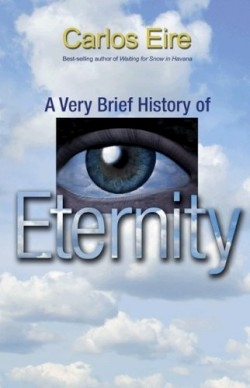A Very Brief History of Eternity
“Ponder this: not a speck will be left of you and me; no trace at all.” Carlos Eire immediately dives into how conceptions of eternity have evolved in Western culture and how they have shaped history. As the Riggs Professor of History and Religious Studies at Yale University and an author of numerous works of religious history, Eire is eminently qualified to tackle this subject. He also wrote the memoir Waiting for Snow in Havana, winner of the National Book Award for nonfiction in 2003.
Eire focuses on “paradigm shifts”—historical moments when thinking changes dramatically—to organize his vast topic into five chronological sections. He begins with Greek and Jewish origins and fast-forwards 1,000 years to the collapse of the Roman Empire in the fifth century. Next, he examines the medieval period, when the notion of eternity was entrenched in Western society, then the early modern period, 1500-1700, when medieval notions of time and eternity were challenged. The fourth section focuses on the Enlightenment of the eighteenth century to the present time, during which time eternity’s importance decreased. Finally, the author offers some thoughts on human mortality. An occasional black and white illustration is included.
Eire is equally comfortable discussing early Christianity or modern physics. He observes that Augustine, in his Confessions, proposed ideas which “…were not only a lucid summation of various tendencies in late antique pagan philosophy and early Christian theology, but also the foundation of much of medieval thought and piety, and even of the very structure of medieval society.” Later, he notes that today’s physicists now hold theories similar to ancient ideas about time and eternity. For example, Ferenc Krausz, of Germany’s Max Planck Institute of Quantum Optics, posits that time might not exist at the most fundamental level of physical realty.
The topic of eternity is, of course, enormous, even when one is confined to examining only Western beliefs. Out of necessity, Eire summarizes philosophers’ beliefs rather than providing great detail. The book fulfills its promise of “very brief,” but offers thorough notes as well as a bibliography as sources for additional study. Because of its summary nature, Eire’s work serves both as a tidy overview of the topic in relation to other historical events, as well as an introduction to ideas which readers might wish to further pursue. (November) Beth Hemke Shapiro
Disclosure: This article is not an endorsement, but a review. The publisher of this book provided free copies of the book to have their book reviewed by a professional reviewer. No fee was paid by the publisher for this review. Foreword Reviews only recommends books that we love. Foreword Magazine, Inc. is disclosing this in accordance with the Federal Trade Commission’s 16 CFR, Part 255.

